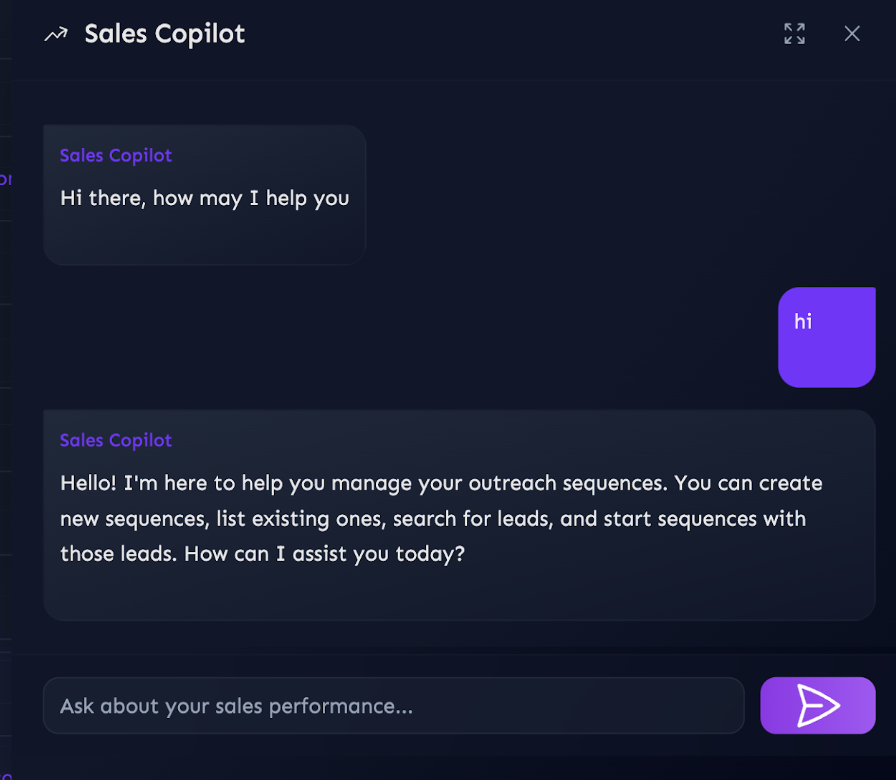AI is quietly transforming how tech companies sell.
From predicting buyer behavior to personalizing outreach at scale, AI-powered tools are helping sales teams work smarter and close deals faster. It’s a game-changer for startups and established players alike—leveling the playing field and boosting efficiency across the board.
But the shift isn’t seamless. Rolling out AI in B2B sales means tackling integration headaches, filling skill gaps, and rethinking how humans and algorithms work together. In this post, we dive into how leading tech companies are navigating these challenges—and what it really takes to unlock the full power of AI-driven sales.
Table of Contents
Six ways AI revolutionizes B2B Sales
The traditional B2B sales landscape has been defined by its complexity: lengthy cycles spanning months, intricate networks of decision-makers, and the careful cultivation of business relationships. Today, artificial intelligence is enhancing these established processes and fundamentally transforming them.
AI sales agents are reshaping B2B sales by breaking previous limitations. A comprehensive review by Nexuscale identified six critical areas where AI is delivering exceptional value in the B2B sales process:
- Predictive Lead Scoring - Identifying high-potential prospects through behavioral analysis and engagement patterns
- Conversational Intelligence - Extracting actionable insights from customer interactions to improve sales approaches
- Sales Forecasting Precision - Delivering more accurate revenue projections through advanced data modeling
- Personalized Engagement at Scale - Creating tailored communications while maintaining efficiency across large customer bases
- Co-pilot - Supporting sales representatives with real-time assistance and guidance during customer interactions
- Sentiment Analysis - Gauging customer emotions and responses to optimize relationship management
Let’s break it down.
1. Predictive lead scoring
Predictive lead scoring leverages AI algorithms to analyze diverse data points, including prospect behavior and engagement patterns, identifying which B2B leads possess the highest likelihood of conversion.
For startups, this capability is crucial, enabling resource-constrained sales teams to move beyond guesswork and prioritize their efforts effectively on high-potential prospects.
This data-driven focus not only boosts sales efficiency but also consistently leads to significant improvements in conversion rates among those prioritized leads, allowing startups to maximize their impact in competitive B2B markets.
2. Conversational intelligence
For dynamic tech startups navigating the demanding B2B sales landscape, conversational intelligence acts as a powerful force multiplier.
It leverages sophisticated automated AI sales agents, powered by natural language processing, to intelligently manage initial prospect engagement by handling outreach, fielding queries around the clock, asking qualifying questions, and scheduling meetings. The true brilliance lies in how this empowers startups, particularly those with lean teams, to achieve significantly more, as these agents automate high-volume, often administrative, front-end tasks.
This automation liberates valuable human sales talent from repetitive duties, redirecting their skills towards complex, high-impact activities like cultivating deep client relationships, delivering compelling demonstrations, and closing intricate B2B deals where expertise truly drives growth, ultimately transforming the sales function into a more strategic and scalable engine.
3. Sales forecasting precision
For B2B startup leaders, accurately predicting revenue is crucial yet notoriously difficult, directly impacting critical decisions from managing cash flow to securing the next funding round.
This is where the precision of AI-driven sales forecasting offers a game-changing advantage over traditional methods. Machine learning models analyze vast amounts of your historical sales data alongside real-time pipeline activities, potentially even incorporating nuanced interaction data captured by autonomous AI sales agents and other touchpoints, to identify subtle patterns and predictive indicators often invisible to the human eye. Instead of relying solely on intuition or static spreadsheet formulas, this approach delivers significantly more accurate revenue projections.
For a startup, this enhanced forecasting precision is invaluable; it enables smarter resource allocation for hiring and marketing, builds crucial credibility with investors and the board through more reliable financial outlooks, allows for quicker adaptation to market shifts, and helps proactively identify both risks and opportunities within the sales pipeline, fostering a more predictable and resilient path to growth.
4. Personalized engagement at scale
Achieving genuine connection in B2B sales demands relevance, yet scaling that personal touch is a classic startup conundrum.
AI sales agents offer a powerful solution, acting as intelligent systems that enable personalized engagement across vast audiences without straining lean resources. By analyzing diverse prospect data points including online behavior, industry specifics, job functions, and interaction history, these agents automatically tailor outreach messages and content for individual relevance. This capability allows a startup to deploy communications that resonate deeply with each recipient's unique context, simultaneously reaching the entire target market without requiring exhaustive manual effort from the sales or marketing team.
Moving decisively beyond generic campaigns, this AI powered personalization demonstrably cuts through market noise, leading to significantly higher engagement, a stronger flow of qualified leads, and the cultivation of robust customer relationships essential for long term B2B retention and predictable growth. It's about making every interaction count, efficiently.
5. Co-pilot
Enhancing sales team productivity within B2B startups hinges on optimizing how representatives utilize crucial sales platforms.
An AI Co-pilot, integrated directly into systems like the CRM, serves as an intelligent assistant focused on streamlining the tasks sales reps perform daily. Its core purpose is to help users work more efficiently within the platform itself, significantly speeding up processes such as locating specific contact details, finding relevant lead information scattered across records, or navigating complex system interfaces to access needed data. By simplifying and accelerating these essential but often time consuming activities, the Co-pilot acts as a productivity multiplier for the human representative.
For a startup, this means valuable time is reclaimed from administrative searches and platform navigation, allowing sales professionals to dedicate more energy to core selling activities like strategic outreach, relationship building, and closing deals, ultimately driving efficiency for lean teams.

6. Sentiment Analysis
In complex B2B sales cycles, grasping the sentiment underlying a prospect's communication is vital for navigating deals successfully, yet these subtle cues are often lost across many interactions.
AI-powered sentiment analysis enables startups to systematically interpret prospect emotions expressed throughout the sales journey. This technology analyzes data from various sales-specific touchpoints, such as email exchanges with potential clients, transcripts from discovery calls and negotiation meetings, and interaction logs generated by AI sales agents engaging prospects through digital channels. By processing language patterns and tonal subtleties within this sales data, the system identifies crucial indicators like developing interest, hesitation about pricing, or strong buying signals.
For a B2B startup's sales team, these insights are invaluable: they can highlight deals potentially at risk due to negative sentiment, pinpoint highly engaged prospects receptive to advancing the sale, and empower representatives to tailor communication and negotiation tactics for greater effectiveness and improved win rates. This deeper emotional intelligence strengthens prospect relationships, specifically within the sales context, and drives more successful outcomes.
Implementation Challenges for Tech Startups
Even as creators and purveyors of innovation, tech startups face substantial hurdles when implementing AI in their own sales operations.
While the promise of enhanced efficiency and data-driven decision-making is compelling, the practical reality of transformation involves navigating a complex landscape of technical, organizational, and strategic challenges. As tech companies seek to revolutionize their sales processes through AI, they must first overcome five critical implementation barriers that can determine the difference between transformative success and costly disappointment.
1. Data Quality and Integration Issues
The foundation of any effective AI sales implementation rests on data, yet this is precisely where many tech startups stumble first. Even organizations with sophisticated technical capabilities often discover their internal data ecosystems are surprisingly fragmented when they attempt to deploy AI solutions.
AI sales agents powered by algorithms can only be as good as the data they consume. When customer information exists across multiple systems (CRM, email platforms, individual spreadsheets), the AI receives an incomplete picture, creating blind spots that lead to flawed recommendations. For example, a sales AI tool might fail to identify a high-potential prospect because critical interaction history lives in a representative's inbox rather than the central database. The issue extends beyond fragmentation to quality: inconsistent formats, duplicate entries, and missing fields that seem minor to humans become significant barriers for AI systems requiring standardized inputs.
2. Balancing Automation and Human Touch
The intersection of AI efficiency and human connection presents a critical balancing act, especially for startups managing lean B2B sales teams. While the allure of automation offers much needed leverage for resource constrained operations, the reality of securing significant B2B deals, which often involve complex solutions and crucial trust building, demands authentic human engagement. The imperative for startup leaders is to strategically deploy AI sales agents as amplifiers, not replacements. Identifying routine, time intensive tasks like initial lead qualification, meeting scheduling, or CRM updates for automation frees up the sales team's vital bandwidth. This allows them to focus intensely on the high value interactions where startups often win: deep consultative discovery, building personal rapport, understanding intricate client problems, and establishing the credibility essential for new players. Ultimately, mastering this balance creates a powerful synergy, blending operational efficiency driven by AI with the genuine human connection required to build lasting B2B relationships and fuel growth.
3. Change Management and Team Adoption
The integration of AI sales agents into agile, high growth environments presents distinct adoption challenges, often stemming from human psychology rather than technological hurdles. Key sales personnel, frequently recruited for strong interpersonal skills and market intuition vital in early stage companies, may perceive these AI tools as undermining their established expertise or threatening their significant contribution to the company's trajectory. Such resistance within lean teams can manifest in ways that critically impede performance, including inconsistent tool adoption, incomplete data entry limiting AI effectiveness, or the dismissal of valuable AI generated insights. Addressing this requires leadership to manage both practical training and the underlying emotional responses to change. It is essential to clearly demonstrate how AI enhances core human capabilities; the technology should be shown automating laborious tasks consuming limited resources, thereby enabling sales professionals to concentrate on complex deal negotiation and strategic relationship development vital for establishing a strong market position.
4. Integration with Existing Tech Stacks
Deploying AI sales agents often highlights integration weaknesses within existing tech ecosystems, particularly where tools like CRMs and marketing automation were adopted rapidly without deep interoperability. This challenge is frequently amplified in resource constrained environments focused on speed, leading to poorly connected systems, data silos, and compatibility issues that impair AI effectiveness. Successfully leveraging AI requires a methodical integration strategy even for agile teams; mapping the current stack and planning for reliable data flow through APIs or dedicated platforms is essential. Prioritizing this foundational integration work, despite initial resource demands, is crucial for building a scalable sales operation and unlocking the true potential of AI tools.
5. ROI Measurement Complexity
Determining the true impact of AI sales investments presents a fundamental measurement challenge, given the complexity of multi-touch B2B sales cycles where isolating AI's specific contribution is difficult. This complexity can be especially pronounced for newer companies, which may lack extensive historical baseline data and face pressure to quickly validate technology ROI amidst resource constraints. Accurately gauging AI's effect on metrics like win rates, deal sizes, or sales cycle length requires more than simple before-and-after snapshots. Organizations achieving meaningful measurement often utilize phased deployments with carefully managed control and experimental groups. This disciplined approach, coupled with analytics tracking both process efficiencies and bottom-line outcomes, allows businesses needing clear proof points, including lean startups, to distinguish genuine AI-driven gains from external factors like market shifts. Without such measurement rigor, companies risk misinterpreting results, potentially undervaluing effective AI tools or overinvesting in systems needing significant refinement.
The Path Forward: Strategic AI Implementation Roadmap
For tech startups to successfully leverage AI sales agents in their sales processes, a strategic approach is essential:
- Start with a clear problem statement rather than implementing AI for its own sake.
- Invest in data cleanup and governance before deploying advanced AI tools.
- Implement phases with clear success metrics for each stage.
- Develop comprehensive training that addresses both technical and cultural aspects.
- Create feedback loops between sales teams and AI systems to continuously improve performance.
The evolution of B2B tech sales is heading toward a balanced fusion of technological capability and human expertise.
Tomorrow's sales organizations will thrive not by choosing between human talent and AI but by strategically blending both. In this emerging landscape, AI sales agent systems will increasingly manage data-intensive tasks, pattern recognition, and routine interactions, creating space for sales professionals to apply their uniquely human abilities to build meaningful relationships, navigate complex organizational dynamics, and craft creative solutions to business challenges.
Tech startups and companies that recognize implementation challenges as strategic opportunities rather than mere obstacles position themselves for sustainable competitive advantage. By addressing data quality foundations, thoughtfully delineating human and automated touchpoints, nurturing genuine team adoption, ensuring seamless technology integration, and implementing disciplined measurement frameworks, organizations can unlock AI's transformative potential while avoiding the disillusionment that has characterized many early adoption efforts.
The future belongs to companies that view AI not as a replacement for their sales teams but as a powerful amplifier of human potential, creating sales experiences that are simultaneously more efficient and more meaningfully human than ever before.
About the author
Kevin Kariuki is Founder & CEO of Nexuscale.ai, pioneering Autonomous Sales Agents for AI automation. Nexuscale eliminates busywork, leverages AI for growth, and frees sales teams for high-value human connections. With a decade in B2B sales leadership, Kevin previously scaled TestGorilla 's pipeline as BDM via AI-driven outreach during hypergrowth. He champions tech that amplifies human sales potential and holds an MBA in Finance and Leadership.










